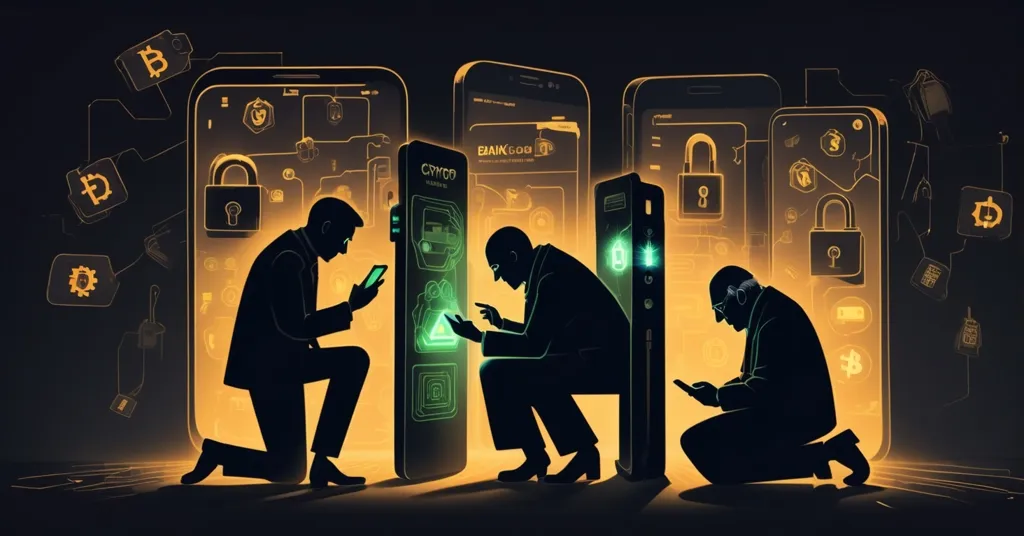California Brothers Indicted in $794K SIM Swapping Scam Targeting Crypto and Bank Security

Brothers-in-Law Indicted for $794,000 SIM Swapping Scam: A Stark Warning for Crypto and Digital Security
Two California brothers-in-law, Ayman Alaaraj and Ahmad Nassar, have been slapped with a 17-count indictment for a cold-blooded scheme that stripped over $794,000 from elderly victims using a tactic known as SIM swapping. By porting phone numbers to bypass two-factor authentication (2FA), they cracked into bank accounts in May 2023, exposing a gaping flaw in digital security that hits just as hard in the cryptocurrency world as it does in traditional finance. This case is a brutal wake-up call for anyone with a Bitcoin wallet or a bank app on their phone.
- Crime Overview: Duo charged with bank fraud and identity theft, stealing $794,000 from elderly victims.
- Tactic Exposed: SIM swapping used to override 2FA, a vulnerability shared by banking and crypto platforms.
- Urgent Lesson: Digital security needs a serious rethink—now—whether you’re holding fiat or Bitcoin.
The SIM Swapping Playbook: How It Works
For those new to the term, SIM swapping—also called phone number porting—is a deceptively simple yet devastating cyberattack. Here’s how it unfolds: First, a scammer gathers personal info about a target, often through phishing emails or social engineering tricks. Next, they contact the victim’s telecom provider, posing as the account holder with stolen details or even bribing an insider. They request the phone number be transferred to a new SIM card under their control. Once approved, the attacker receives all calls and texts meant for the victim—including those one-time 2FA codes sent by banks or crypto exchanges to verify logins. With that code, they’re in. Your account, whether it holds dollars or Bitcoin, is now theirs to plunder. It’s a glaring reminder that a phone number, something most of us don’t think twice about, can be the skeleton key to our digital lives. For a deeper dive into how these attacks work, the mechanics are chillingly straightforward.
The Crime: $794,000 Stolen from Vulnerable Targets
The U.S. Attorney’s Office in the Eastern District of California has charged Ayman Alaaraj and Ahmad Nassar with orchestrating this exact scam in May 2023, targeting two elderly individuals. Nassar, the apparent ringleader, executed the SIM swap to hijack a victim’s phone number, bypassing mobile 2FA to access accounts at two separate banks. The result? Over $794,000 drained, leaving the victims not just broke but buried under unpaid credit card debts racked up by the thieves. Why the elderly? It’s no accident. Many lack the tech know-how to spot phishing attempts or suspicious account activity, making them easy prey for grifters who exploit trust and ignorance with ruthless precision. More on the official charges and case details reveals the calculated nature of this fraud.
Once the money was in hand, the duo didn’t exactly play it subtle. They laundered funds through pass-through accounts opened in the victims’ names, funneled $100,000 through Alaaraj’s businesses—Balance Bookkeeping, Tax and Notary, and Atheer Investments—and spent like they’d hit the jackpot. ATM withdrawals, personal checks, transfers via Western Union and Zelle, online gambling binges, and even a shiny Mercedes purchase painted a picture less of master criminals and more of a neon sign screaming “arrest me now.” It’s almost comical if it weren’t so infuriating.
Legal Hammer Drops: Severe Penalties and a Repeat Offender
The consequences, if convicted, are no minor slap on the wrist. Each count of bank fraud carries up to 30 years in prison and a $1 million fine. Aggravated identity theft adds a mandatory 2-year sentence per count, with fines up to $250,000 or twice the gross gain or loss. Nassar also faces an additional charge of access device fraud, which could tack on another 20 years and a $250,000 penalty. As of February 7, 2024, Nassar is back in custody for violating supervised release terms from a prior stint, while Alaaraj was ordered to self-surrender. And here’s the kicker: this isn’t Nassar’s first rodeo. Court records show a 2019 conviction for similar crimes—possessing access devices, identity theft, and firearm possession as a felon. Released in March 2021, he clearly learned nothing. It begs the question: why aren’t repeat offenders like this locked out of the system for good? Check the latest updates on penalties for this ongoing case.
From Banking to Bitcoin: A Shared Vulnerability
While this case gutted traditional bank accounts, don’t think for a second that crypto users are safe. The playbook is identical in the Bitcoin and altcoin space, where SIM swapping has bled millions from unsuspecting holders. Consider this: in 2019, a single SIM swap attack drained over $1 million from a Bitcoin investor’s Coinbase account in under 24 hours. Studies estimate annual crypto losses from such scams in the tens of millions, yet SMS-based 2FA—tied to your oh-so-hackable phone number—remains the default on many exchanges. Whether you’re logging into Chase or Binance, that text message code is a liability waiting to be exploited. For a community that prides itself on decentralization and cutting out middlemen, relying on telecom-controlled security is a bitter irony. Real-world stories of crypto theft via SIM swaps highlight just how devastating these attacks can be.
Could your phone number be the backdoor to your Bitcoin stash? Most of us don’t even consider it. Crypto users, from newbies buying their first Satoshi to OGs hodling for a decade, often underestimate how a simple SIM swap can wipe them out. Unlike bank accounts, where fraud might be reversible with enough red tape, crypto losses are often final. No chargebacks, no customer service hotline—just a cold, hard lesson in user sovereignty gone wrong. Curious about how SIM swapping impacts Bitcoin security? The risks are very real.
Systemic Failures: Telecoms and Exchanges in the Crosshairs
Let’s not pin this solely on individual negligence. The real scandal is the systemic rot enabling these scams. Telecom providers have been roasted for years over laughably weak verification processes for number porting. A 2021 FTC report flagged thousands of SIM swapping complaints, with insiders often complicit for bribes as low as $100. It’s not just negligence; it’s a broken business model where your digital identity is up for grabs to the highest bidder. Banks and crypto exchanges aren’t off the hook either. Pushing SMS-based 2FA as “secure” in 2024 is borderline malpractice when alternatives exist. Why are platforms still defaulting to a system tied to a centralized, hackable point of failure? Recent cases of phone porting and 2FA bypass underscore the scale of this issue.
Here’s a controversial thought: shouldn’t telecoms and exchanges foot the bill for SIM swap losses? If they can’t secure our numbers or offer better defaults, why are users left holding the bag? In the spirit of disrupting the status quo, it’s time to demand accountability from these gatekeepers. Bitcoin’s ethos of cutting out middlemen should extend to security—centralized systems are failing us, and scammers like Alaaraj and Nassar are just the tip of the iceberg.
Securing Your Digital Future: Practical Steps and Future Horizons
So, what can you do to avoid being the next headline? First, ditch SMS-based 2FA wherever possible. Authenticator apps like Google Authenticator or Microsoft Authenticator are free, easy to set up, and far harder to hijack remotely. Hardware keys like YubiKeys offer near-unbreakable security, though at $25-50 a pop and with a learning curve, they’re not for everyone—especially less tech-savvy users or those in regions where crypto adoption outpaces infrastructure. Still, for anyone serious about protecting their Bitcoin or altcoin holdings, these are non-negotiable upgrades. Explore some essential security tips for Bitcoin wallets to stay ahead of threats.
Next, call your telecom provider today and set up a porting PIN or account lock—a security code required to transfer your number. It’s not foolproof, as lax employees can still be duped, but it’s a hurdle for attackers. Monitor your accounts obsessively; unusual activity could be the first sign of a breach. For crypto OGs, go further: split private keys across hardware wallets and offline backups. No exchange should hold your full stack—ever. Newbies, start small with those authenticator apps; five minutes of setup can save your savings. For more on preventing SIM swapping vulnerabilities, there are actionable guidelines worth following.
Looking ahead, could decentralized tech offer a lifeline? Blockchain-based identity or authentication systems—think a tamper-proof ledger verifying you without a phone number—align with Bitcoin’s user-control ethos. Ethereum projects are tinkering with multi-signature wallets that sidestep single-point failures like SMS. But let’s be real: scalability and mainstream adoption are years away. Do we wait for the perfect solution while scammers run rampant, or demand telecoms and platforms patch their gaping holes now? As champions of effective accelerationism, I say we push for both—innovate fast, but don’t let the gatekeepers off the hook in the meantime.
One counterpoint: even Bitcoin’s design, while avoiding telecom pitfalls with cold storage, isn’t immune to human error. Lose your seed phrase or plug a hardware wallet into a compromised device, and no amount of decentralization saves you. Security isn’t just tech; it’s behavior. We’ve got to drill that into every user, from fiat to crypto.
Key Takeaways and Burning Questions on Digital Security
- How does SIM swapping threaten both banking and crypto users?
It hijacks your phone number to intercept 2FA codes, granting attackers access to bank accounts or Bitcoin wallets. The tactic exploits a shared reliance on SMS, making no digital asset truly safe without better safeguards. - Why are elderly and less tech-savvy individuals prime targets?
Limited digital literacy makes them vulnerable to social engineering and slow to detect breaches, a risk mirrored among crypto newcomers who may not grasp security best practices. - What immediate steps can crypto users take to protect themselves?
Switch to app-based or hardware 2FA like YubiKeys, set up porting PINs with telecoms, and never store all funds on exchanges. Constant vigilance over account activity is critical. - Can decentralized solutions eliminate SIM swapping risks?
Blockchain-based identity or multi-sig wallets could cut out vulnerable middlemen like telecoms, but they’re not yet scalable. They’re a future worth accelerating, though today’s fixes can’t wait. - Should telecoms and exchanges bear liability for SIM swap losses?
If they can’t secure phone numbers or default to safer 2FA, accountability seems fair. Pushing for liability could force systemic change, aligning with Bitcoin’s rejection of untrustworthy gatekeepers.
The saga of Alaaraj and Nassar isn’t just a crime story—it’s a glaring indictment of our digital defenses, from fiat banking to Bitcoin. We cheer freedom and privacy at every turn, but those mean nothing if scammers can stroll through the cracks. If the future of finance rests on decentralized tech, shouldn’t our security be future-proof too? Let’s demand better—tougher policies, smarter tools, and a mindset shift—before the next $794,000 vanishes. Your wallet, crypto or otherwise, depends on it.



